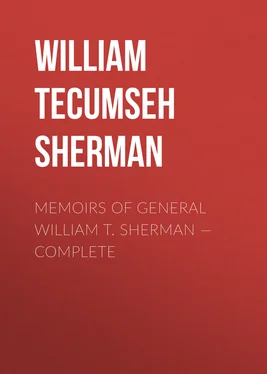William Tecumseh Sherman - Memoirs of General William T. Sherman — Complete
Здесь есть возможность читать онлайн «William Tecumseh Sherman - Memoirs of General William T. Sherman — Complete» — ознакомительный отрывок электронной книги совершенно бесплатно, а после прочтения отрывка купить полную версию. В некоторых случаях можно слушать аудио, скачать через торрент в формате fb2 и присутствует краткое содержание. Жанр: Биографии и Мемуары, История, foreign_edu, foreign_antique, foreign_prose, на английском языке. Описание произведения, (предисловие) а так же отзывы посетителей доступны на портале библиотеки ЛибКат.
- Название:Memoirs of General William T. Sherman — Complete
- Автор:
- Жанр:
- Год:неизвестен
- ISBN:нет данных
- Рейтинг книги:4 / 5. Голосов: 1
-
Избранное:Добавить в избранное
- Отзывы:
-
Ваша оценка:
- 80
- 1
- 2
- 3
- 4
- 5
Memoirs of General William T. Sherman — Complete: краткое содержание, описание и аннотация
Предлагаем к чтению аннотацию, описание, краткое содержание или предисловие (зависит от того, что написал сам автор книги «Memoirs of General William T. Sherman — Complete»). Если вы не нашли необходимую информацию о книге — напишите в комментариях, мы постараемся отыскать её.
Memoirs of General William T. Sherman — Complete — читать онлайн ознакомительный отрывок
Ниже представлен текст книги, разбитый по страницам. Система сохранения места последней прочитанной страницы, позволяет с удобством читать онлайн бесплатно книгу «Memoirs of General William T. Sherman — Complete», без необходимости каждый раз заново искать на чём Вы остановились. Поставьте закладку, и сможете в любой момент перейти на страницу, на которой закончили чтение.
Интервал:
Закладка:
I invested my earnings in this survey in three lots in Sacramento City, on which I made a fair profit by a sale to one McNulty, of Mansfield, Ohio. I only had a two months' leave of absence, during which General Smith, his staff, and a retinue of civil friends, were making a tour of the gold-mines, and hearing that he was en route back to his headquarters at Sonoma, I knocked off my work, sold my instruments, and left my wagon and mules with my cousin Charley Hoyt, who had a store in Sacramento, and was on the point of moving up to a ranch, for which he had bargained, on Bear Creek, on which was afterward established Camp "Far West." He afterward sold the mules, wagon, etc., for me, and on the whole I think I cleared, by those two months' work, about six thousand dollars. I then returned to headquarters at Sonoma, in time to attend my fellow aide-de-camp Gibbs through a long and dangerous sickness, during which he was on board a store-ship, guarded by Captain George Johnson, who now resides in San Francisco. General Smith had agreed that on the first good opportunity he would send me to the United States as a bearer of dispatches, but this he could not do until he had made the examination of Oregon, which was also in his command. During the summer of 1849 there continued to pour into California a perfect stream of people. Steamers came, and a line was established from San Francisco to Sacramento, of which the Senator was the pioneer, charging sixteen dollars a passage, and actually coining money. Other boats were built out of materials which had either come around Cape Horn or were brought from the Sandwich Islands. Wharves were built, houses were springing up as if by magic, and the Bay of San Francisco presented as busy a scene of life as any part of the world. Major Allen, of the Quartermaster's Department, who had come out as chief-quartermaster of the division, was building a large warehouse at Benicia, with a row of quarters, out of lumber at one hundred dollars per thousand feet, and the work was done by men at sixteen dollars a day. I have seen a detailed soldier, who got only his monthly pay of eight dollars a month, and twenty cents a day for extra duty, nailing on weather-boards and shingles, alongside a citizen who was paid sixteen dollars a day. This was a real injustice, made the soldiers discontented, and it was hardly to be wondered at that so many deserted.
While the mass of people were busy at gold and in mammoth speculations, a set of busy politicians were at work to secure the prizes of civil government. Gwin and Fremont were there, and T. Butler King, of Georgia, had come out from the East, scheming for office. He staid with us at Sonoma, and was generally regarded as the Government candidate for United States Senator. General Riley as Governor, and Captain Halleck as Secretary of State, had issued a proclamation for the election of a convention to frame a State constitution. In due time the elections were held, and the convention was assembled at Monterey. Dr. Semple was elected president; and Gwin, Sutter, Halleck, Butler King, Sherwood, Gilbert, Shannon, and others, were members. General Smith took no part in this convention, but sent me down to watch the proceedings, and report to him. The only subject of interest was the slavery question. There were no slaves then in California, save a few who had come out as servants, but the Southern people at that time claimed their share of territory, out of that acquired by the common labors of all sections of the Union in the war with Mexico. Still, in California there was little feeling on the subject. I never heard General Smith, who was a Louisianian, express any opinion about it. Nor did Butler King, of Georgia, ever manifest any particular interest in the matter. A committee was named to draft a constitution, which in due time was reported, with the usual clause, then known as the Wilmot Proviso, excluding slavery; and during the debate which ensued very little opposition was made to this clause, which was finally adopted by a large majority, although the convention was made up in large part of men from our Southern States. This matter of California being a free State, afterward, in the national Congress, gave rise to angry debates, which at one time threatened civil war. The result of the convention was the election of State officers, and of the Legislature which sat in San Jose in October and November, 1849, and which elected Fremont and Gwin as the first United States Senators in Congress from the Pacific coast.
Shortly after returning from Monterey, I was sent by General Smith up to Sacramento City to instruct Lieutenants Warner and Williamson, of the Engineers, to push their surveys of the Sierra Nevada Mountains, for the purpose of ascertaining the possibility of passing that range by a railroad, a subject that then elicited universal interest. It was generally assumed that such a road could not be made along any of the immigrant roads then in use, and Warner's orders were to look farther north up the Feather River, or some one of its tributaries. Warner was engaged in this survey during the summer and fall of 1849, and had explored, to the very end of Goose Lake, the source of Feather River. Then, leaving Williamson with the baggage and part of the men, he took about ten men and a first-rate guide, crossed the summit to the east, and had turned south, having the range of mountains on his right hand, with the intention of regaining his camp by another pass in the mountain. The party was strung out, single file, with wide spaces between, Warner ahead. He had just crossed a small valley and ascended one of the spurs covered with sage-brush and rocks, when a band of Indians rose up and poured in a shower of arrows. The mule turned and ran back to the valley, where Warner fell off dead, punctured by five arrows. The mule also died. The guide, who was near to Warner, was mortally wounded; and one or two men had arrows in their bodies, but recovered. The party gathered about Warner's body, in sight of the Indians, who whooped and yelled, but did not venture away from their cover of rocks. This party of men remained there all day without burying the bodies, and at night, by a wide circuit, passed the mountain, and reached Williamson's camp. The news of Warner's death cast a gloom over all the old Californians, who knew him well. He was a careful, prudent, and honest officer, well qualified for his business, and extremely accurate in all his work. He and I had been intimately associated during our four years together in California, and I felt his loss deeply. The season was then too far advanced to attempt to avenge his death, and it was not until the next spring that a party was sent out to gather up and bury his scattered bones.
As winter approached, the immigrants overland came pouring into California, dusty and worn with their two thousand miles of weary travel across the plains and mountains. Those who arrived in October and November reported thousands still behind them, with oxen perishing, and short of food. Appeals were made for help, and General Smith resolved to attempt relief. Major Rucker, who had come across with Pike. Graham's Battalion of Dragoons, had exchanged with Major Fitzgerald, of the Quartermaster's Department, and was detailed to conduct this relief. General Smith ordered him to be supplied with one hundred thousand dollars out of the civil fund, subject to his control, and with this to purchase at Sacramento flour, bacon, etc., and to hire men and mules to send out and meet the immigrants. Major Rucker fulfilled this duty perfectly, sending out pack-trains loaded with food by the many routes by which the immigrants were known to be approaching, went out himself with one of these trains, and remained in the mountains until the last immigrant had got in. No doubt this expedition saved many a life which has since been most useful to the country. I remained at Sacramento a good part of the fall of 1849, recognizing among the immigrants many of my old personal friends—John C. Fall, William King, Sam Stambaugh, Hugh Ewing, Hampton Denman, etc. I got Rucker to give these last two employment along with the train for the relief of the immigrants. They had proposed to begin a ranch on my land on the Cosumnes, but afterward changed their minds, and went out with Rucker.
Читать дальшеИнтервал:
Закладка:
Похожие книги на «Memoirs of General William T. Sherman — Complete»
Представляем Вашему вниманию похожие книги на «Memoirs of General William T. Sherman — Complete» списком для выбора. Мы отобрали схожую по названию и смыслу литературу в надежде предоставить читателям больше вариантов отыскать новые, интересные, ещё непрочитанные произведения.
Обсуждение, отзывы о книге «Memoirs of General William T. Sherman — Complete» и просто собственные мнения читателей. Оставьте ваши комментарии, напишите, что Вы думаете о произведении, его смысле или главных героях. Укажите что конкретно понравилось, а что нет, и почему Вы так считаете.












